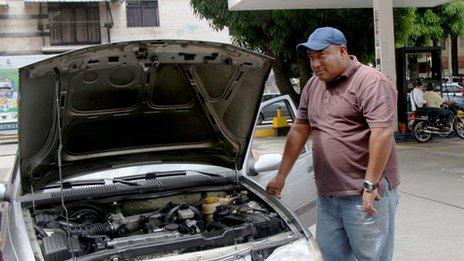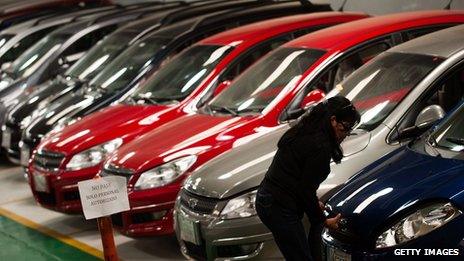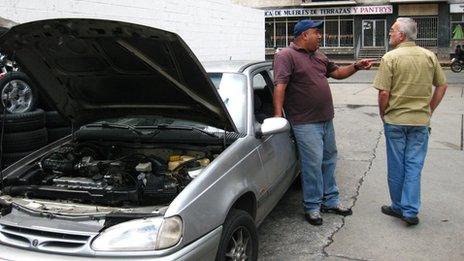Why used cars can fetch more in Venezuela than new cars
- Published
Older cars have become a safe investment, as Irene Caselli reports from Caracas
Used cars have become an obsession for Daniel, a taxi driver in Venezuela's capital, Caracas.
He goes online every day to check whether there are new deals and knows the prices of every model off the top of his head.
He is trying to replace his car, which is not in the best of conditions: the air conditioning does not work, and neither does one of the locks.
Spare parts are not available and buying a new car is not an option for him. The problem is not that he cannot afford one, but that new cars are almost impossible to get hold off.
"The last time I managed to buy a new car was 17 years ago," Daniel recalls.
"Now it's impossible because car dealerships don't have cars, and there are many people on the waiting list. You may have to wait three or four years to get a new car."
Economic distortions
Because it is so difficult to buy a new car, a paradoxical situation has developed in Venezuela, where new cars are now cheaper than used ones.

Daniel is keen to sell his current car and buy a better one
Economists say the explanation is simple and dates back to economic reforms introduced by the late president Hugo Chavez that were aimed at reducing inequality, poverty and malnutrition.
Price regulations aimed at driving down the cost of everyday products, as well as currency controls brought in to avoid capital flight, has created several economic distortions.
Reduced access to dollars has limited the ability of Venezuelan businesses to import goods and - combined with the price regulations - created shortages of basic items such as milk, corn flour and toilet paper.
The automotive sector has not been spared. Imports have fallen and internal production has slumped because price regulations keeps profit margins low.
The government has tried to remedy the situations by teaming up with Chinese and Iranian companies to produce cars in Venezuela, but demand still outpaces supply.

Chinese companies have opened car dealerships in Venezuela
Used cars are a different story. There are easy to get hold of - at a price - and many Venezuelans see them as an investment.
"Cars, like real estate, have become a way for Venezuelans to save money because banks don't keep up with inflation," says Gabriel Villamizar, an economist with the Ecoanalitica think tank, which is critical of the government.
Venezuela has one of the highest inflation rates in the world. According to the country's central bank it hit almost 50% in September.
Venezuelans like Daniel know that if their bolivars sit in a bank, they will lose value every day. Cars are different - their value goes up, at the very least, in pace with inflation.
Daniel bought his 1995 Daewoo Racer for 100,000 bolivars ($15,870 at the official exchange rate) in June. Now, he says, the car is already worth 130,000 bolivars.

The value of Daniel's car has gone up by 30,000 bolivars since June
Even old gas-guzzlers are not a problem to sell, as Venezuela has the world's largest oil reserves and petrol here is cheap. A full tank of subsidised petrol costs no more than five bolivars ($0.79), less than a bottle of water.
'Mafia fraud'
The government blames "speculation and usury" for the situation.
"A mafia was born around the car industry. Several actors are involved, from the production side to the commercialisation," Elio Serrano, a member of the National Assembly for the governing United Socialist Party of Venezuela (PSUV), told the BBC.
"These people have been defrauding the Venezuelan people over the past 10 years," he added, arguing that this "mafia" made Venezuelans believe their cars were worth up to six times what they would fetch on the international market.
That is why Mr Serrano has pushed a bill aimed at regulating the prices of both new and used cars and fining vendors who do not comply.
The bill was passed in August and is expected to be signed into a law by President Nicolas Maduro soon.
But economists say the problems with the car industry are only a sign of a wider malaise and that the bill could even make things worse in the long run.
"This government is applying to this sector a medicine that hasn't worked in other sectors - price regulation," says Mr Villamizar.
"In the long run, the underlying problems are not tackled."
As Daniel stops to fill his car's petrol tank, some men approach him and ask him whether he wants to sell it. He talks to the potential buyers, who get the engine checked.
In the end, they cannot agree a deal, but Daniel remains confident that despite its faults his car will sell at a good price.
"It's a safe investment," he says.
- Published5 September 2013
- Published15 May 2013
- Published5 March 2013